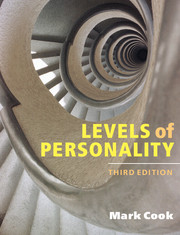Book contents
- Frontmatter
- Contents
- List of Figures
- List of Tables
- List of Boxes
- Preface to the third edition
- Preface to the second edition
- Preface to the first edition
- 1 Gideon's army: the study of individual differences
- Part I The surface
- Part II Below the surface 1: the biological line
- Part III Below the surface 2: the phenomenal line
- Part IV Below the surface 3: the motivational line
- Part V Examples
- 10 The school bully: aspects of aggression
- 11 Does peace prevent homosexuality? Theories of sexual orientation
- 12 Bouncing back: resilience
- 13 Is Hitler mad? Personality disorders
- 14 Square pegs and round holes: personality in the workplace
- 15 The line ahead: the future of personality research
- References
- Author index
- Subject index
- References
12 - Bouncing back: resilience
from Part V - Examples
Published online by Cambridge University Press: 05 January 2013
- Frontmatter
- Contents
- List of Figures
- List of Tables
- List of Boxes
- Preface to the third edition
- Preface to the second edition
- Preface to the first edition
- 1 Gideon's army: the study of individual differences
- Part I The surface
- Part II Below the surface 1: the biological line
- Part III Below the surface 2: the phenomenal line
- Part IV Below the surface 3: the motivational line
- Part V Examples
- 10 The school bully: aspects of aggression
- 11 Does peace prevent homosexuality? Theories of sexual orientation
- 12 Bouncing back: resilience
- 13 Is Hitler mad? Personality disorders
- 14 Square pegs and round holes: personality in the workplace
- 15 The line ahead: the future of personality research
- References
- Author index
- Subject index
- References
Summary
What happens to you here is for ever.…Things will happen to you from which you could not recover, if you lived for a thousand years.
Orwell (1949)George Orwell's Nineteen Eighty Four describes Winston Smith being ‘cured’ and ‘made sane’ by O’Brien of the Thought Police. First Winston is beaten, interrogated for days on end and forced to confess to innumerable crimes he could not possibly have committed (such as murdering his wife, who is still alive). Then he is subjected to a machine that seems to be tearing his body apart. Next he is connected to what sounds like an early electro-convulsive therapy machine that re-programs his memories. Finally he is taken to Room 101 to be threatened with ‘the worst thing in the world’: having starving sewer rats let loose on his face.
This chapter describes some lines of research on how people cope with adversity; what sort of person copes best; how people learn to cope; and develop resilience. Many psychologists spend a lot of their time dealing with life's casualties; happy, well-adjusted people have less need of their services. This creates the impression psychology is all about maladjustment, abnormality, immaturity and mental illness. This chapter tries to focus on the other end of all these dimensions: maturity, normality, mental health, ego strength, hardiness, positive adjustment – all aspects of the general theme of resilience.
- Type
- Chapter
- Information
- Levels of Personality , pp. 314 - 337Publisher: Cambridge University PressPrint publication year: 2012



